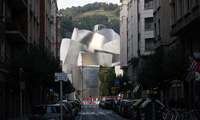 Hey presto! We're the best
Hey presto! We're the bestShould Britain have a new capital of culture every two years? Jonathan Jones on the regeneration game
Jonathan Jones | The Guardian, Thursday 8 January 2009 | Article history
Triumph ... the Guggenheim, the key to Bilbao's transformation. Photograph: Gary Calton/Guardian
We sniffed at the euro and decline to join. We carp at every new regulation. But finally, it seems, the EU has given us something we like. Liverpool's year as capital of culture has been judged such a success that culture secretary Andy Burnham wants Britain to nominate its own four- or possibly two-yearly culture capital, with cities competing for an accolade that will include hosting events such as the Turner prize and, of course, lots of colourful banners in the city centre.
The idea that you can nominate a city as a capital of culture, import some national awards ceremonies, a bit of French street theatre, and a few paintings by Klimt and, hey presto, you've got a Renaissance is silly: real capitals of culture are hundreds of years in the making. But that isn't what this is really about. It's about the economy, stupid - the cultural economy. Since the 1980s, cities all over the world have discovered that culture is not, as the old Marxists had it, a superstructure that reflects the underlying economy. Rather, it's the other way around. Culture can perform miracles, creating needs and desires that didn't previously exist, as well as attracting a host of economic vitalities - restaurants, shops, hotels - around its magically liveable spaces. Cities need culture more than they need factories, or so the world has discovered since the end of the industrial age.
Barcelona, Glasgow, Newcastle and Bilbao are triumphant examples of urban regeneration, beacons of success that Europe's Capital of Culture programme has tried to translate to less fortunate places, such as Salonika, Cork and Liverpool. Now Burnham proposes our own British version. It is a crisis measure, the arts equivalent of the Chancellor's emergency consumer boost, and it comes at a time when, potentially, the idea of culture as a tool of urban regeneration is in doubt.
Can culture really perform miracles as the credit economy disintegrates? There is surely a real risk that a faith in the arts as agents of change, which has become universal among urban planners since Barcelona's Olympics-inspired success, is founded on air, or on the same postmodern delusion that everything is possible which has fuelled the current economic madness. In Britain, with our huge investment in our cultural image, this is especially worrying.
Already, many British cities are in the middle of remarkable cultural regenerations, all of them kickstarted without any help from a phoney "capital of culture" title. Go and look at the Angel of the North in Gateshead, and you will encounter tourists from all over the world on the same quest. Visit Cardiff Bay and you will recognise landmarks from Doctor Who; not only does this city have fine new architecture, it has its own rift in time and space.
Over the past 15 years or so, Britain's cities have rediscovered an ebullience they last possessed in the Victorian age. Places such as Cardiff, Gateshead and Newcastle, Manchester and Glasgow have their own culture - which means their own accent, their own ethnic mix, as well as their own history and architecture. Culture is not a buzz you can import. What's sad is cities trying to buy in homogenised art and architecture without any respect for their own character; this cannot be healthy. One example is Derby, where the new Quad arts centre has been created in a city whose existing museum, housing a unique collection of paintings by Joseph Wright of Derby, is in a dilapidated state.
I grew up in an industrial town, Wrexham, that had plenty of history, including a Renaissance church, and a beautiful modernist swimming pool; yet the town was such that you didn't see or feel that identity. It just seemed ugly. The real joy of a city like London is that it values its every quirk and memory. In London, every bit of here and now seems exciting; it matters that, say, the playground you take your child to is actually part of an 18th-century foundling hospital.
Britain's cities don't need imported spectacle, or visiting awards ceremonies, so much as a sense of their own worth. The city outside London that is most truly a culture capital - Glasgow - never forgets that.
If Burnham's dreams become a reality, the first British capital of culture should be somewhere whose accent you can cut with a knife, whose bricks are grimy with identity. Character is culture, as scousers knew long before the EU title came their way.
 Hey presto! We're the best
Hey presto! We're the best